Motorola Razr 40 Ultra Review
The Motorola Razr 40 Ultra certainly stands out in the clamshell market.












Verdict
The Motorola Razr 40 Ultra represents the pinnacle of clamshell foldables in 2023 with a premium design, game-changing exterior display, great camera performance and solid everyday use. The battery might leave some wanting more, but for most people, this won’t be too much of a problem.
Pros
- Premium clamshell foldable design
- Genuinely useful 3.6-inch exterior display
- Great camera performance from main 12MP sensor
- Top-end 6.9-inch pOLED foldable display
Cons
- Battery could only last about a day
- Snapdragon 8+ Gen 1 is a year old
Key Features
- Large cover displayAt 3.6 inches and 144Hz, the Razr 40 Ultra has the biggest, most capable external display around.
- Premium display techPacking a foldable 6.9-inch pOLED panel with 165Hz refresh rate, LTPO support and HDR10+, the Razr 40 Ultra is designed for binging.
- All-day battery lifeThe larger battery, combined with Snapdragon 8+ Gen 1 battery efficiency and LTPO display tech, can deliver all-day battery life – but it won’t stretch into a second day.
Introduction
Motorola’s top-end Razr 40 Ultra boasts a number of firsts for foldables including the biggest, fastest external display to date at 3.6 inches and 144Hz, but is there more to it than a big external display?
While it might not look all that different from its predecessor, the Razr 40 Ultra represents the peak of Motorola’s design prowess with an elegant design, premium materials and one of the least noticeable creases I’ve seen to date. It’s also capable of delivering performance, both in terms of everyday use and when snapping photos.
For those wondering, the Razr 40 Ultra is the same as the Razr 40 Plus in the US, with both offering the same design and spec – it’s just branded differently in the States.
The question is, with clamshell foldable prices dropping in 2023, can Motorola justify the £1,049/$999 price tag? After a week with the Razr 40 Ultra, I’m very confident that it can.
Design & displays
- Largest cover display around
- 6.9-inch 165Hz pOLED internal display
- Well-built, premium design
The Motorola Razr 40 Ultra certainly has the same Razr feel as the 2022 model, but it’s much more refined, premium and lightweight this time around — and not just because of that huge external display.
There’s a new hinge system at play here that Motorola claims is doing a number of things; it allows the phone to fold without a gap, dramatically reducing the look of the crease and getting rid of the sensation you get when running your finger over it. Those are bold claims, but I must admit, the company has done something impressive here.
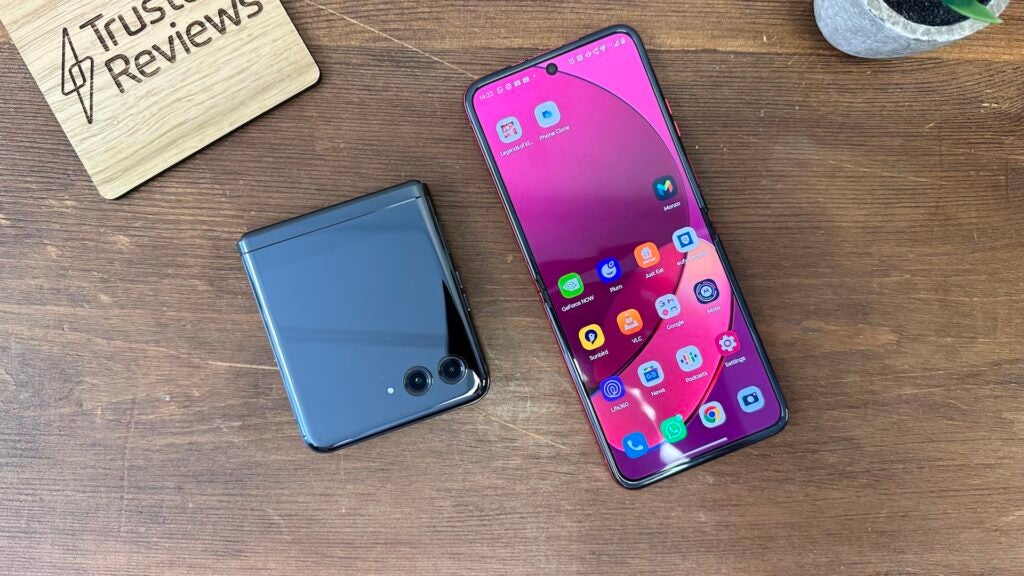
I will say that while it’s almost completely gapless, you do still see a slither of light shine through when holding it up against bright light, but it’s a massive step forward from the rather large gap found in the 2022 Razr, and I’ve found that it’s enough to seriously reduce the amount of dust and detritus that builds up on that inner foldable display compared to other foldables I’ve used.
The crease, on the other hand, is somewhat of a masterpiece. It’s just about there if you look at it off-angle and try and catch it in the light but, looking straight on, you’d barely tell that the display could fold in half. It’s a similar story with the hinge — you can notice something when running your finger over the crease but it doesn’t feel noticeable or intrusive.
It also allows the Razr 40 Ultra to hold the title of the thinnest clamshell smartphone when fully folded, according to Motorola, measuring in at 15mm thick, and a thin 7mm when unfolded. It does feel nice and pocketable despite the gargantuan 6.9-inch display found within, one of the biggest benefits of clamshell foldables.
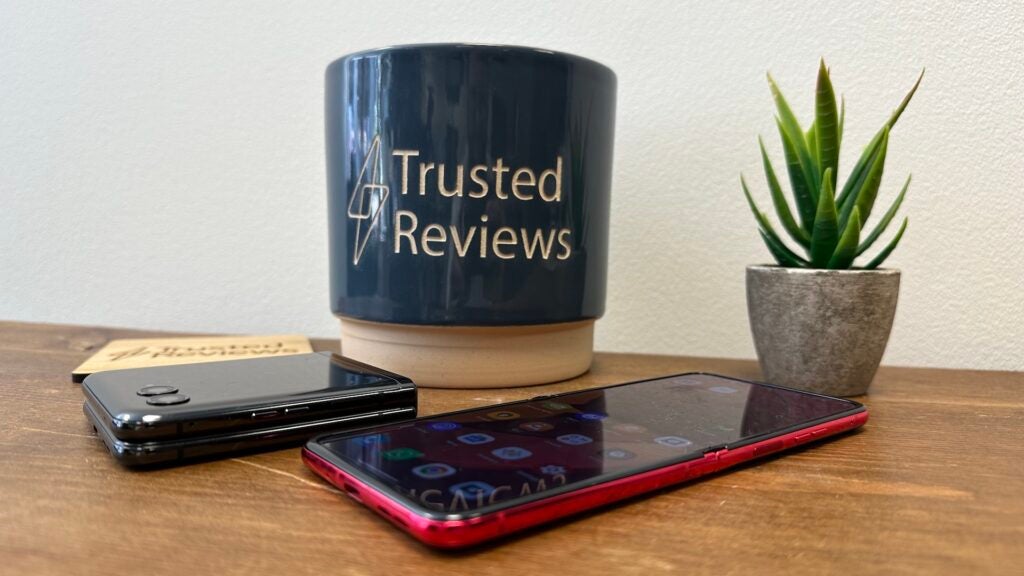
Rather than storing a whopping great big phone in your pocket, it folds down to a compact form that’s nice and easy to carry. It’s also ideally suited to one-hand use when using that outer display, with my thumb easily able to reach all corners of the external display.
It’s also just a well-built, good-looking smartphone with the choice of either vegan leather or glass on the rear, and it’s available in some stunning colour options including Viva Magenta, Pantone’s colour of the year in 2023. The pinky-red finish is absolutely stunning, with a shiny aluminium frame in a complementary shade.
It’s also available in a nice shade of blue with the same vegan leather rear, as well as a shimmering black glass finish for those looking for something more understated.
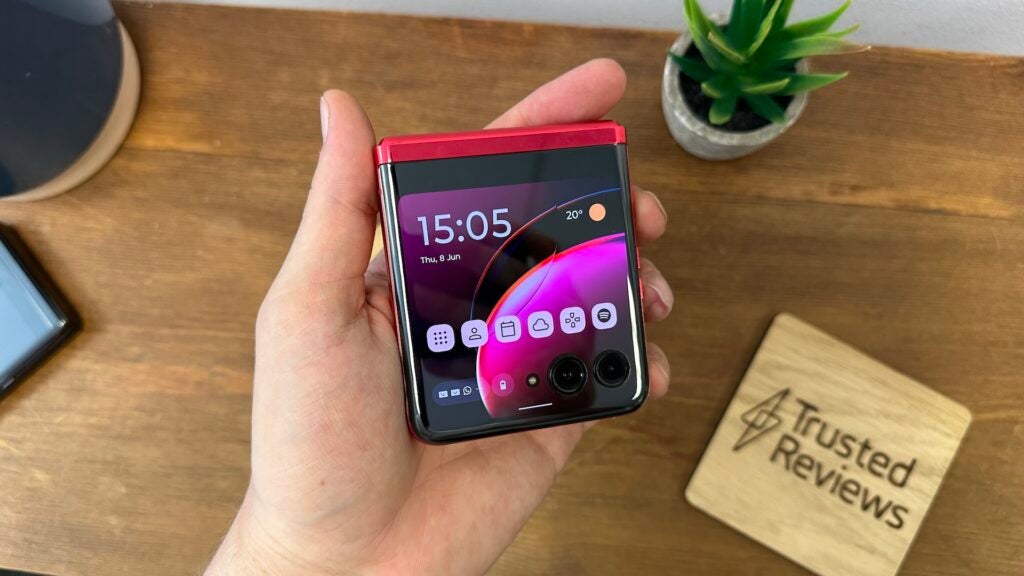
Of course, it is all about the displays with foldables, so let’s start with that outer panel. It’s the largest of any clamshell foldable now measuring in at a whopping 3.6 inches, and it’s not simply a big screen either.
Boasting pOLED tech and an incredible 144Hz refresh rate not seen on any other clamshell, the exterior display sits in a league of its own. It has a dual camera cutout in the bottom-right or top-left depending on your orientation, which can sometimes get in the way, but it’s something I think most people will happily live with.
The external display also has a new layout with new widgets designed for the external display and the ability to run any Android app you’d like, making it much easier to reply to a WhatsApp message and quickly like a tweet without unfolding the phone.
It’s this ability to run any app on the external display that’s truly a game-changer for the clamshell foldable form factor. I was able to do much more with the Razr 40 Ultra than any other clamshell including the fairly useful Oppo Find N2 Flip, making it much easier to respond to incoming messages and check emails, control YouTube playback via my TV and even play Call of Duty Mobile.
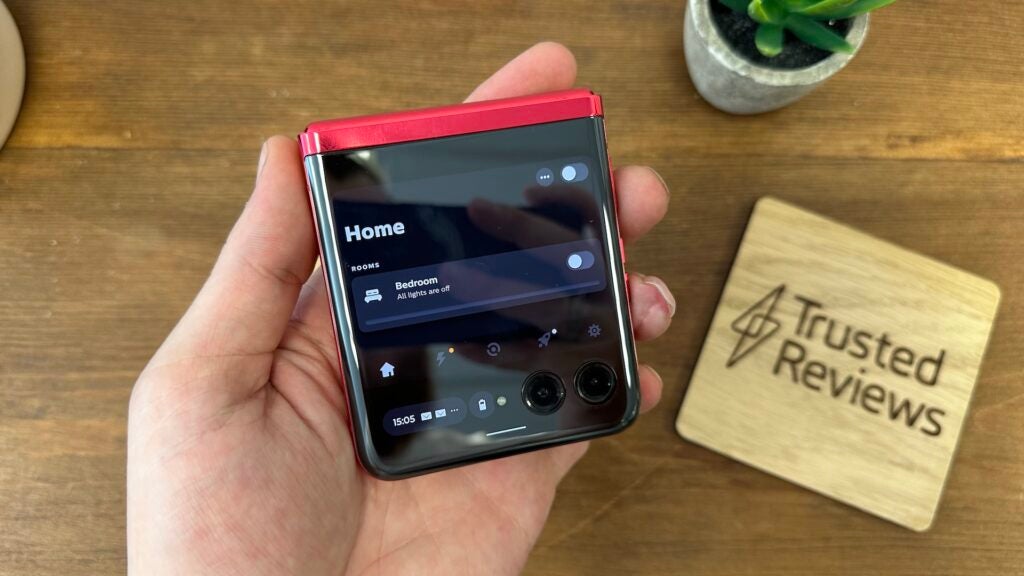
The latter isn’t ideal, of course, but it’s still possible, and that’s what I love so much about the form factor.
It doesn’t load all apps perfectly, with portrait-orientated apps like Instagram struggling with the 16:9 aspect ratio of the external display, but it worked flawlessly with more apps than I initially expected.
It’s a similar story with the internal display; it’s not just big for bigs-sake.
It’s a high-end 6.9-inch pOLED display with flagship features including a 165Hz refresh rate with LTPO support and HDR10+ that has so far delivered a bright, crisp visual experience, regardless of whether I’m messaging on WhatsApp, scrolling through Instagram or binging TikTok videos.
There is a catch to that 165Hz refresh rate though; you can’t set it at a constant 165Hz refresh rate, instead only allowing for a fixed 60Hz refresh rate or a dynamic refresh rate that is capable of going up to 165Hz when needed. The problem? It’s very rarely needed.
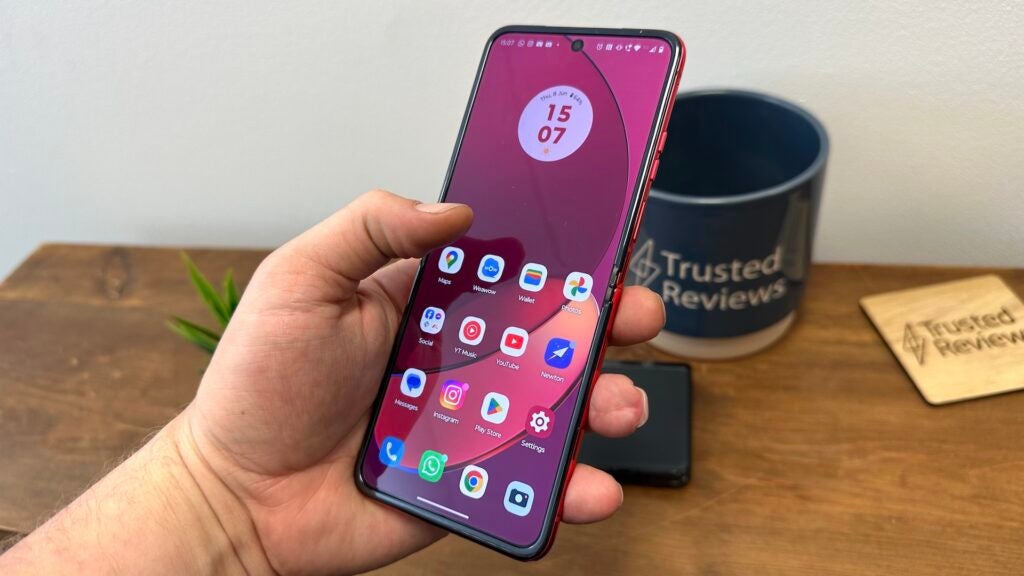
It’s also noticeably taller than other phones, even 6.8-inch panels like the Samsung Galaxy S23 Ultra, thanks to a tall-and-narrow 22:9 aspect ratio. I didn’t have any complaints about actually using the display, though it did feel a bit long – like I was holding a remote control – at times.
The only real downside compared to the competition is the water resistance, or should I say lack of, coming in at IP52 compared to the IPX8 of the Samsung Galaxy Z Flip 4.
It is an improvement over the Razr 2022 which had no kind of protection, and it does admittedly do an admirable job at protecting from dust ingress, but it still makes me a little worried about getting water on/near the phone – something I’ve not had to worry about with candybar smartphones for a while now.
Cameras
- Twin 12MP rear cameras
- 32MP selfie camera
- F/1.5 aperture is among the widest around
The Motorola Razr 40 Ultra’s dual 12MP rear camera offering may not be able to take on the likes of the Oppo Find N2 Flip on paper, but there’s much more to cameras than megapixel count. Interestingly, the highest resolution sensor seems to be the internal selfie camera — aka the one people will use least — clocking in at 32MP.
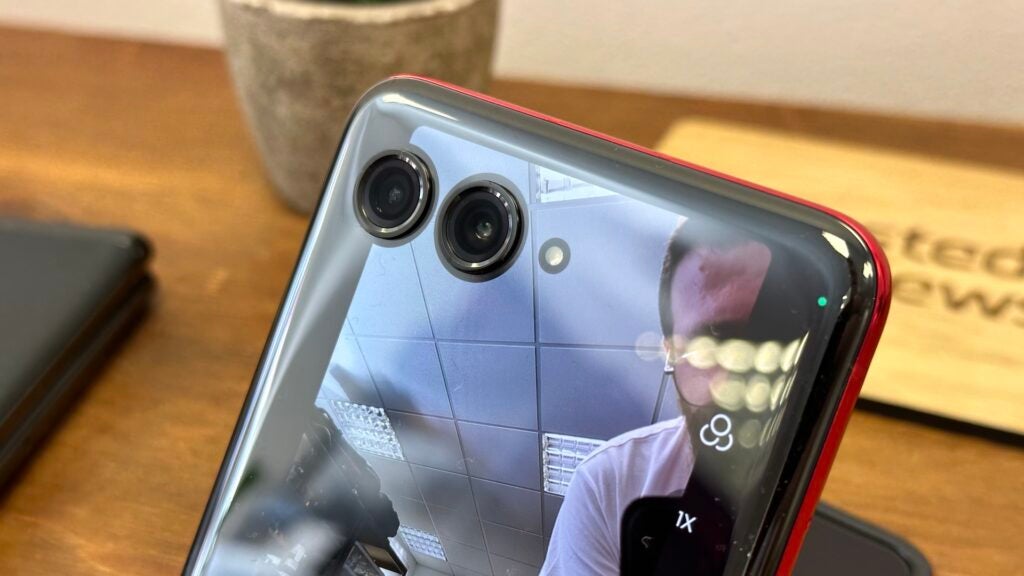
The main 12MP snapper does an admirable job in well-lit scenarios like the below shots of the streets of Madrid, with great vibrancy and plenty of light thanks to that wide f/1.5 aperture and OIS capabilities. It’s also easy for the camera to pick up on smaller details in images like the individual stands of my dog Luna’s hair.
Colours are generally quite vibrant without being too much, though that does depend on the shot in question. Some images, like those of my flower basket, as well as the greens of grass and the blues of the sky, can look a little too colourful, but that’s something common among smartphone snappers. Vibrant colours make for better social media shots, apparently…











The f/1.5 aperture also adds a more natural bokeh to close-up photos than much of the competition, making for a more subtle effect than the OTT blur on offer from the phone’s dedicated Portrait mode.


I wasn’t expecting much in the way of low-light performance given the phone’s slim dimensions and relatively low megapixel count that stops it from using pixel-binning tech to improve the overall levels of light and detail, but I was pleasantly surprised. Even in areas with next to no light, like my garden with a smattering of low-brightness LED lights, there’s decent detail on offer.
My one complaint is focusing in low light; despite featuring PDAF focusing technology, I found that it’d sometimes completely miss the mark in low light, resulting in rather soft images. That doesn’t tend to happen with tech like Laser Autofocus in my experience, which is interestingly available on the cheaper standard Razr 40.



It’s hard to tell whether Motorola has done any meaningful work with the accompanying 13MP ultrawide lens, sporting the same resolution and wide angle as the Razr (2022). There are at least some new software smarts, with the phone able to use the ultrawide lens to snap macro photography for extreme close-up action.
As expected, though, macro photography remains difficult to shoot on a fixed-focus camera, and it was tough to get good close-ups of subjects like bees in the flowers or a ladybird that landed on a table in front of me. I just about managed it eventually, but there were plenty of failed shots before I got ‘the one’.




Ultrawide shots are fine in well-lit environments, though there are areas of shots that look a little too soft with notable noise reduction tech on display. Take the below shot of Luna as an example; it’s a fine-looking image generally, but there’s a notable blur in areas of her fur where the camera couldn’t quite discern enough detail.
Don’t expect much in terms of low light though, with the f/2.2 aperture delivering much darker, muddier and generally softer images than those from the main sensor.





The good thing about the foldable form factor is that you can use the rear-facing cameras as selfie cameras, complete with a digital viewfinder on the 3.6-inch external display, allowing for high-end selfies on both the main and ultrawide lenses. It can also be placed on a table and opened halfway for a makeshift tripod, making it a versatile option for snapping on the go.
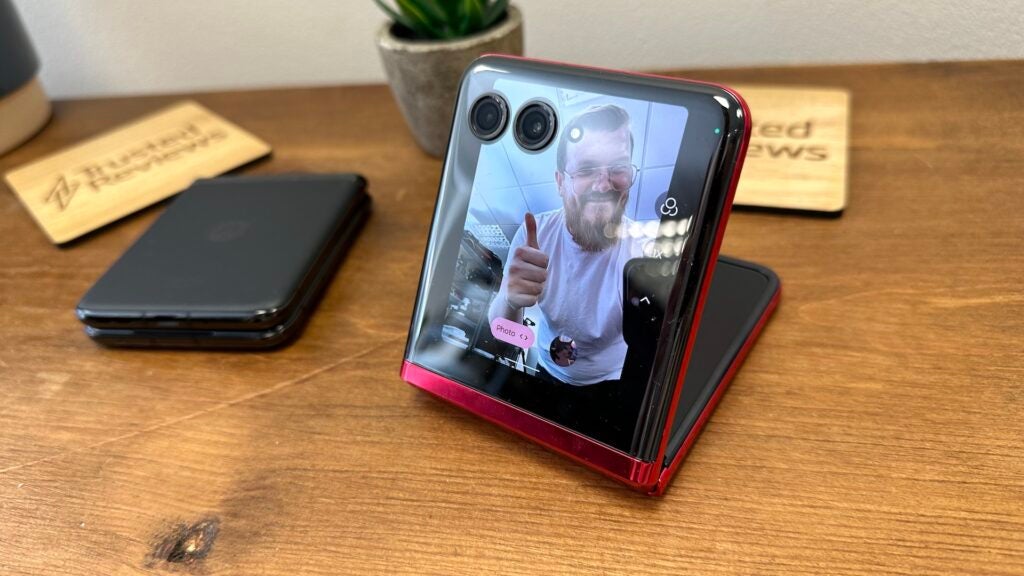
If you don’t like the idea of using the rear-facing cameras to take selfies — or you like to chat a lot via video call — then the 32MP internal selfie camera should suffice. My selfies are generally quite crisp and lack the washed-out colour palette sometimes present on Motorola selfie cameras.

Performance
- Snapdragon 8 Plus Gen 1 chipset
- Can’t quite handle long gaming sessions
- Close-to-stock Android 13 experience
Surprisingly considering the smartphone’s ‘Ultra’ moniker that usually suggests the best of the best, the chipset found within the Razr 40 Ultra isn’t the most powerful one that money can buy.
No, instead, the smartphone sports the (nearly one-year-old) Snapdragon 8 Plus Gen 1 chipset — the same as that found in the previous-gen Razr (2022) and other 2022 foldables like Samsung’s Galaxy Z Flip 4.
Now, that’s not to say that performance isn’t solid — the smartphone hasn’t shown a hint of stutter or lag during standard use — but it does feel like an area where Motorola could’ve scored an easy win, especially as I expect Samsung’s upcoming Z Flip 5 to use the same exclusive Snapdragon 8 Gen 2 for Galaxy chipset as the flagship S23 range.
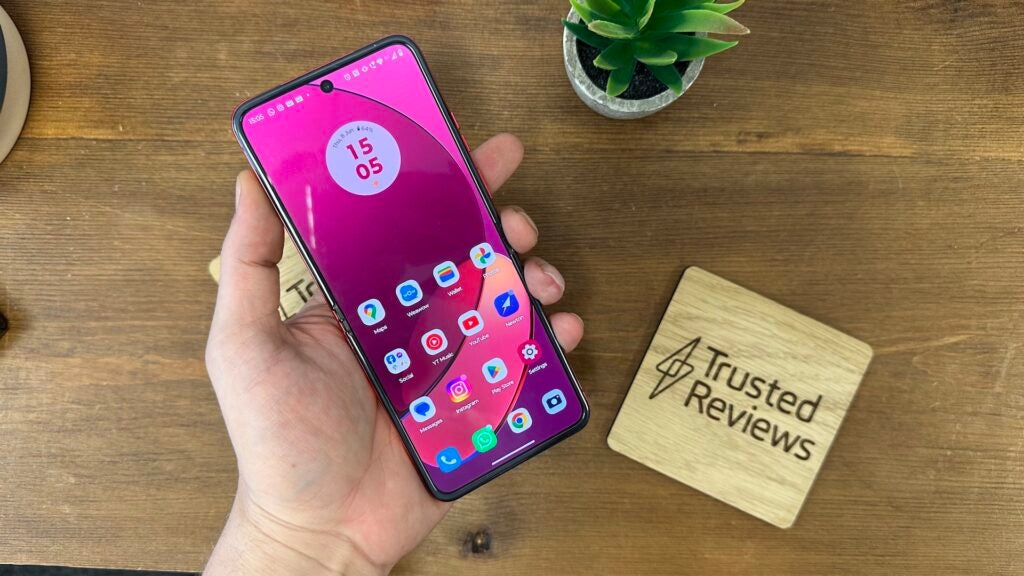
So, while it’s very much a premium experience for now, we expect the competition to surpass the processing power of Motorola’s top-end foldable in the coming months. Not great for one of the most expensive flip-style foldables around right now…
Regardless, that Snapdragon chipset is paired with a rather healthy (but not leading) 8GB of RAM and 256GB of storage for those that need it. Probably a good thing too, considering the lack of a microSD card to expand storage further down the road.
Where the Razr 40 Ultra really falls over is in terms of gaming. While it can handle light gaming with relative ease – think games like Candy Crush and Survivor.io – it does begin to struggle with higher-specced games like Genshin Impact and Call of Duty Mobile. The phone gets hot fairly quickly and with that comes a serious reduction in performance, resulting in frame rate drops after just 20 minutes of play.
That’s backed up by benchmarks too, with the Razr 40 Ultra scoring well in general CPU and GPU tests but showing a marked decrease in performance when running 3DMark’s Wildlife Extreme Stress Test. That particular test runs a high-end game simulator 20 times to compare performance – and it started to dip after just three cycles.
Audio performance is also rather strong with decent amounts of volume delivered from the clamshell’s stereo speaker setup, and Dolby Atmos support on offer when listening to music via headphones further enhances the experience.
Motorola is famed for its near-stock approach to Android, rivalled only by the likes of Nokia and Google itself, and that’s just as true with the Razr 40 Ultra as other Android 13 devices like the Motorola Edge 40.
Everything I said there is just as true here; the approach to Android 13 is so close to stock that you’ll find very little to complain about, and where there are tweaks, these are usually for the benefit of the end user.
This includes features like Moto Gestures that allows quick access to the torch and camera to ReadyFor, Motorola’s Windows companion software that allows you to run your favourite Android apps, reply to messages and even use the phone’s camera as a webcam when connected to Windows 10 or Windows 11 devices.
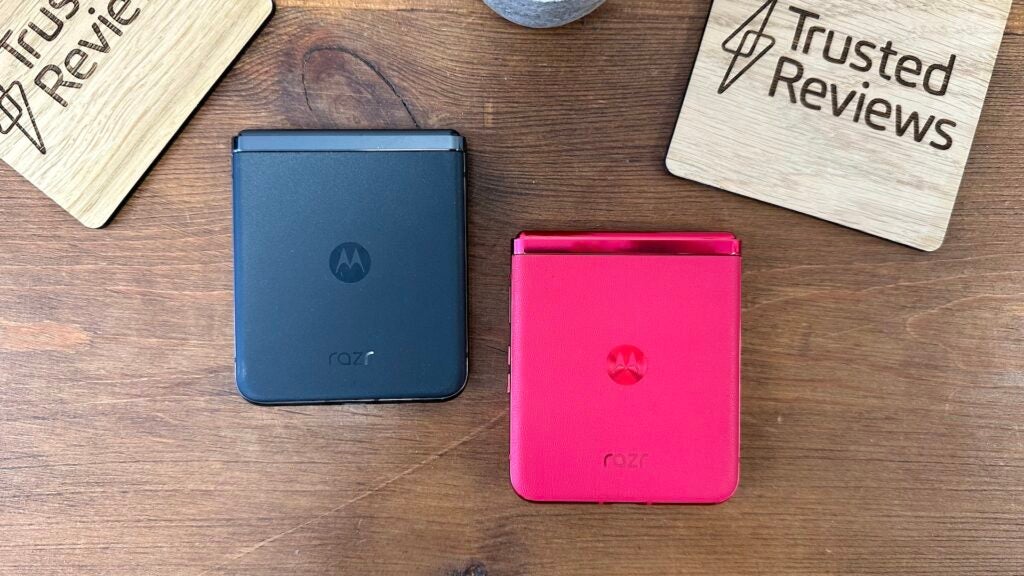
Battery life
- All-day battery life – just about
- 3800mAh cell is still quite small
- 30W fast charging capabilities
Battery life is one area where the Razr 40 Ultra could do with a bit of improvement. Sure, it’s a slightly larger 3800mAh cell than the 3500mAh Razr 2022, but the Razr 40 Ultra has both a larger internal and external display to power. It’s worth noting that it’s also smaller than the cheaper Razr 40, which boasts the same 4300mAh cell as the Oppo Find N2 Flip.
That said, battery life is fine most of the time, with the phone able to handle a full day’s use without needing a top-up. That includes light browsing, watching TikToks, replying to messages and emails and snapping pictures every now and again, equating to an average of 4 hours of screen time split between the two displays before it’ll hit the 20% warning.
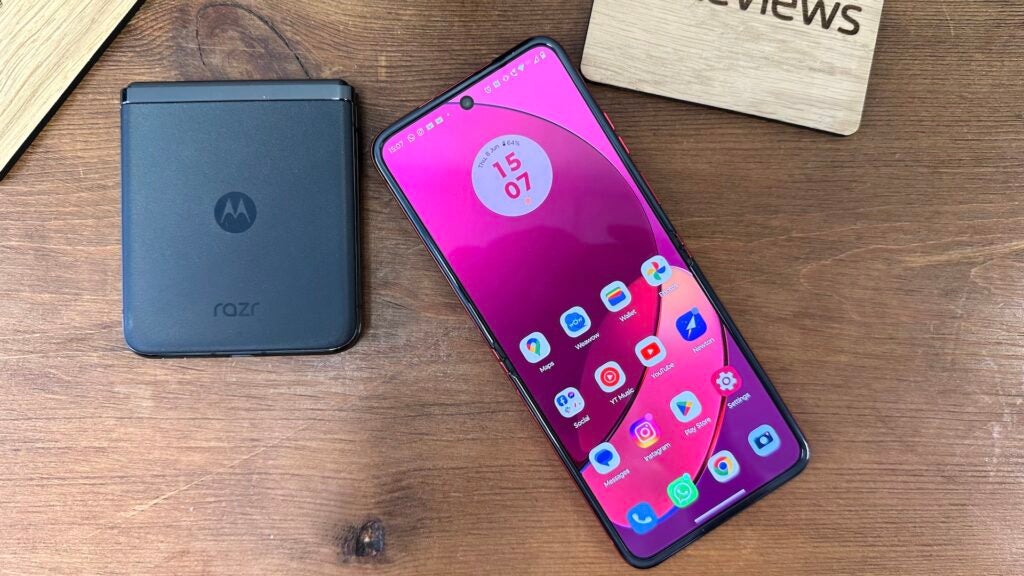
There was one particularly busy day in Madrid where I charged the phone fully at 5pm, only for it to drop back down to 30% by 1am, but I’m putting that down to excessive use and a lot of incoming WhatsApp messages from a particularly chatty group chat.
In terms of benchmarks, the Razr 40 Ultra drained 9% of its battery over an hour of Netflix HDR playback which, while decent, is a little on the high side compared to the candybar competition. It’s a similar story with light gaming, draining 6% over 30 minutes of light gameplay.
The Razr 40 Ultra hasn’t improved on charge speed, charging at the same 30W as its predecessor. Considering the Find N2 Flip’s 44W charging provides a 50% charge in 24 minutes, it would’ve been nice to see a bump in charge speed here — especially considering the Motorola Edge 40 Pro boasts rapid 125W charging tech.
However, it should still charge relatively quickly given the smaller-than-average cell, offering 36% in 15 minutes, 60% in 30 minutes and a full charge in just under an hour.
Latest deals
Should you buy it?
You hate constantly unfolding a foldable: the 3.6-inch external display allows you to do more without unfolding the phone, from replying to messages to running full Android apps.
You need long battery life: The 3800mAh battery may be larger than its predecessor but it also has to power larger internal and external displays. As a result, the Razr 40 Ultra just about lasts all day but not much longer.
Final Thoughts
The Razr 40 Ultra sets a new bar in the clamshell foldable market with not only significant improvements to the hinge, and thus the crease, but with one of the most capable external displays around.
It takes the exterior display from an afterthought for notifications to a display that you can feasibly run apps on, allowing you to quickly perform tasks like turn on a Philips Hue bulb or reply to a WhatsApp without having to unfold the phone as often.
The main 12MP camera is also of note, with OIS and an f/1.5 aperture not only delivering crisp images during the day but in low-light conditions too, though the latter can suffer from a slightly misjudged focus without any kind of laser autofocus tech. Still, it’s a capable snapper that you can use to take selfies thanks to the folding form factor of the phone.
It’s also a solid everyday performer with the inclusion of a Snapdragon 8+ Gen 1, though the year-old chipset doesn’t look great on paper, and while the 3800mAh cell is an increase on the Razr 2022, it has to power larger internal and external displays. As a result, it’s a phone that’ll just about get you through a day’s use, but it’s certainly not a two-day phone.
Overall, though, the Razr 40 Ultra is one of the best foldable phones and the most capable clamshell smartphone on the market right now, offering an exquisite blend of great design and great hardware at a price that’s not too hard to swallow.
How we test
We test every mobile phone we review thoroughly. We use industry-standard tests to compare features properly and we use the phone as our main device over the review period. We’ll always tell you what we find and we never, ever, accept money to review a product.
Find out more about how we test in our ethics policy.
Used as a main phone for a week
Thorough camera testing in well-lit and low-light conditions
Tested and benchmarked using respected industry tests
FAQs
No, but it does a decent job at repelling dust with an IP52 rating.
Yes, but at a rather slow 5W.








